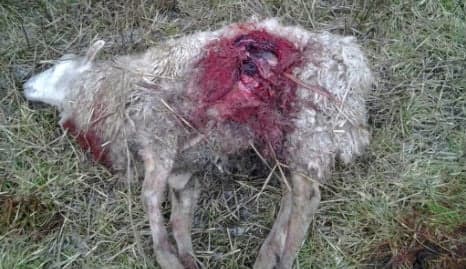Danish farmers call for help as wolf attacks rise

Danish sheep farmers are demanding action from the government after yet another sheep death has been killed by wolves.
Sheep farmer Åse Svendsen on Thursday found one of his sheep dead at his farm in Skærbæk, on the edge of the Vaderhavet national park in western Jutland.
“On the basis of an autopsy in the field, our game consultant has concluded that it probably was a wolf attack,” Bent Rasmussen, a local officer at the The Danish Nature Agency told the Ritzau news agency.
The killing was the latest in a string of wolf attacks in western Jutland that have taken place this winter.
According to the Facebook Page "Her er ulven i Danmark” or “Here is the wolf in Denmark”, 26 sheep have been attacked by wolves since the predators were first spotted in the country in 2012, of which 21 have died.
Farmers were paid a total of 50,200 Danish kroner ($7,200) in compensation for animals lost to wolves between 2013 and 2016.
“There are areas where we have to acknowledge there have been so many attacks that wolves are undoubtedly now permanent residents,” Henrik Bertelsen, who represents farmers on the Danish Wildlife Management Council’s wolf committee, told Ritzau.
He said that when the group was formed, the idea was that areas with permanent wolf populations would get quickly designated so that funding could be provided to farmers to build secure enclosures for their flocks.
“But it is simply too slow,” Bertelsen complained. “It is as if the authorities were not prepared for the situation arising. It is tremendously unsatisfactory.”
A dead wolf was found in northern Jutland in 2012, 200 years after the species was eradicated from the country in 1813.
Since then the animals have gradually reestablished themselves, reaching a population of about 40 animals, according to experts from Aarhus University.

Comments
See Also
Sheep farmer Åse Svendsen on Thursday found one of his sheep dead at his farm in Skærbæk, on the edge of the Vaderhavet national park in western Jutland.
“On the basis of an autopsy in the field, our game consultant has concluded that it probably was a wolf attack,” Bent Rasmussen, a local officer at the The Danish Nature Agency told the Ritzau news agency.
The killing was the latest in a string of wolf attacks in western Jutland that have taken place this winter.
According to the Facebook Page "Her er ulven i Danmark” or “Here is the wolf in Denmark”, 26 sheep have been attacked by wolves since the predators were first spotted in the country in 2012, of which 21 have died.
Farmers were paid a total of 50,200 Danish kroner ($7,200) in compensation for animals lost to wolves between 2013 and 2016.
“There are areas where we have to acknowledge there have been so many attacks that wolves are undoubtedly now permanent residents,” Henrik Bertelsen, who represents farmers on the Danish Wildlife Management Council’s wolf committee, told Ritzau.
He said that when the group was formed, the idea was that areas with permanent wolf populations would get quickly designated so that funding could be provided to farmers to build secure enclosures for their flocks.
“But it is simply too slow,” Bertelsen complained. “It is as if the authorities were not prepared for the situation arising. It is tremendously unsatisfactory.”
A dead wolf was found in northern Jutland in 2012, 200 years after the species was eradicated from the country in 1813.
Since then the animals have gradually reestablished themselves, reaching a population of about 40 animals, according to experts from Aarhus University.

Join the conversation in our comments section below. Share your own views and experience and if you have a question or suggestion for our journalists then email us at [email protected].
Please keep comments civil, constructive and on topic – and make sure to read our terms of use before getting involved.
Please log in here to leave a comment.